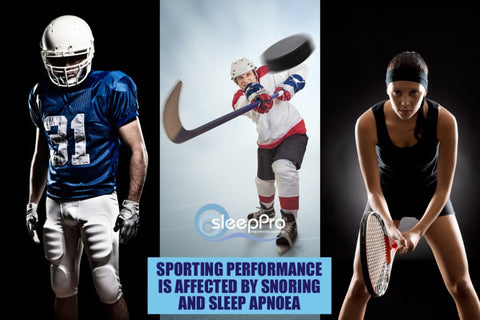
Sleep disorders are so painfully common among the general population, but there’s one demographic that suffers significantly more than the rest of us: athletes. A new study from Finland has some good news for this group, though, because researchers now say that for the first time ever, they’ve shown just how treatable sleep disorders among athletes really are.
The survey revealed that one in four of the athletes involved in the study suffered from significant sleep problems, including having trouble falling asleep, snoring, and unbelievably, having serious issues with their breathing, such as sleep apnoea. Most of the athletes surveyed admitted to sleeping too few hours and one in six of them even used sleeping pills.
Although many of the athlete’s sleep troubles were classified as “significant” the study showed that general sleep-related guidance and personalized treatment plans greatly improved their sleep. Simple ‘Stop snoring mouthpieces’ and more customised versions can restrict or even eliminate the problem and greatly improve their performance and fitness as a result. Lack of sleep can reduce performance quality, though, and as many as one in four athletes involved in the study reported that sleep-related guidance helped to improve their athletic performance.
Aside from affecting how good someone is at sport, lack of sleep can also have serious health consequences and also lead to weight gain.
Sleep disorders among many groups of professional sportsmen and sportswomen are a widely reported problem, and researchers have suggested a variety of issues that might cause them. Intense training, rigorous schedules, and frequent traveling, sometimes across world time zones, are only some of the factors that may disrupt sleep patterns.
Professional athletes travel a great deal, often flying overnight before waking up to an early-morning practice or next-day game, and share risks for sleep problems with other high-frequency travellers and people who work non-traditional schedules. People in these jobs are at higher risk for sleep disorders such as insomnia and obstructive sleep apnoea. They also can be at elevated risk for health problems associated with poor sleep, including obesity, Type 2 diabetes, and cardiovascular disease.
The professional sports world appears to be continuing to turn a great deal of attention to what has previously been a much-overlooked issue: sleep.
In the USA, it’s the National Hockey League that is leading the way and that is addressing sleep problems on several fronts. Last year, teams like the New York Jets decided to hire sleep specialists to work with players on improving their sleep habits, and the sleep-friendly adjustments made to the team’s practice schedule improved their overall performance considerably.
At the same time numerous players of American football have recently headlined with major sleep apnoea problems but after watching a football game, it’s hard to believe that any of these big, tough men might be seriously ill. Injured, maybe. But sick? It seems very unlikely.
However, according to a recent study by New England Journal of Medicine, this might well be the case. Sleep apnoea affects about 4% of the general population, but when football players participated in sleep studies, the percentage rose to 14% of all players. Offensive and defensive linemen had an even higher prevalence of apnoea with 34% of them affected, probably due to their higher weight.
All sports are affected – even Sumo wrestlers in Japan – and many of them have serious problems with sleep apnoea caused by extra weight, which in that particular arena is an obvious advantage. Or is it? New investigations conducted by the Douai Hospital in Tokyo have determined that if the wrestler suffers from obstructive sleep apnoea, he lacks the concentration needed for the sport. This may be causing injuries and is also causing those wrestlers to lose more matches than is normal or to even miss tournaments.
The problem is easily solved for all these sportsmen and women – just as it is for the rest of us. If you suffer from sleep disorders or obstructive sleep apnoea you must deal with it. It’s easy and inexpensive to do so and can have a major effect on your life whether you’re a sports professional or not.


